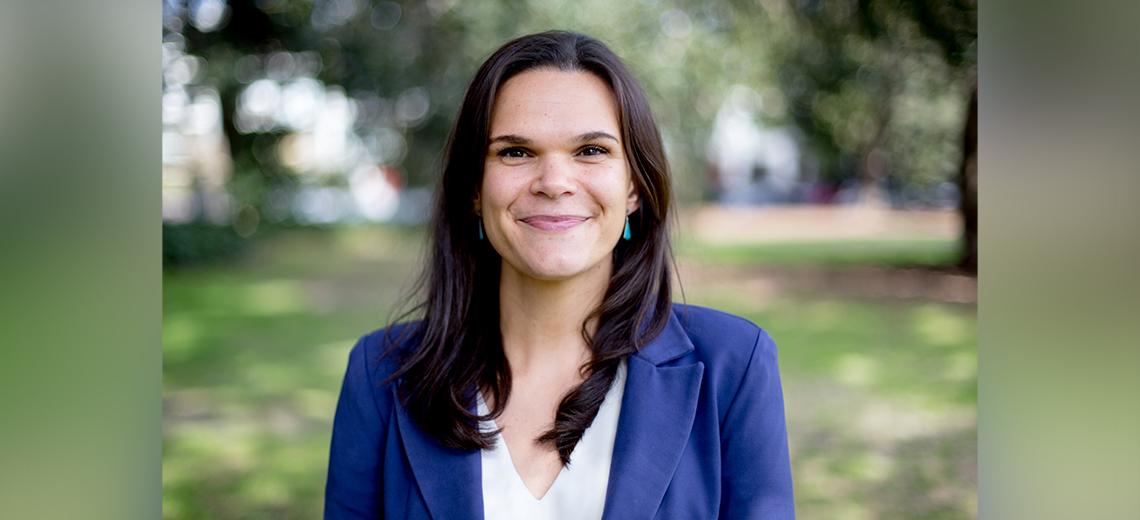
4 minute read
This October, The Australian National University (ANU) College of Business and Economics (CBE) celebrates Indigenous Business Month (IBM).
For nine years, IBM has encouraged conversations about Indigenous business, as well as foster relationships and connections.
The 2023 IBM theme – To gather, together – was born from the heart of building relationships to seek solace, feedback, information and ideas, and generate friendship and connection. It emphasises the importance of bringing together local communities and exploring the crossovers between what’s happening in Indigenous businesses, in the community and in their lives.
This month, CBE caught up with Wiradjuri woman and ANU alumna Leila Smith, who is the CEO of Aurora Foundation, to share her insights on the opportunities available at ANU for the future Indigenous leaders. Prior to her current role, Leila was the Knowledge Translation Manager at the Lowitja Institute, where she was awarded a Roberta Sykes scholarship to attend Harvard Business School’s Strategic Perspectives in Non-profit Management course.
She is the Chair of the American Australian Association, a board member of the United States Studies Centre, the Perth USAsia Centre, Remote Area Health Corps, and a Charlie Perkins Scholar with a Master in Public Policy from the University of Cambridge.
When discussing her reasons for choosing ANU to do her Bachelor of Arts in 2004, she names the Tjabal Indigenous Higher Education Centre, which provides a meeting place and support base on campus for Indigenous students and staff, as a large factor in this decision.
It was the Tjabal team and leadership who welcomed me to the campus and supported me to excel academically through a strong cultural and social network.
In this interview, Leila offers advice to up-and-coming Indigenous students, shares the pathways she utilised while at university, and speaks about the work she’s currently involved in.
Q. As the CEO of the Aurora Foundation, what would you say to other Indigenous people who might be considering studying at ANU?
Think about what success at university means to you. If that is about learning and working with a wide range of academics across several disciplines who are leaders in their field, then ANU is very well-placed to facilitate this.
Q. What support did you access whilst studying at ANU and throughout your career?
I accessed all sorts of support while at ANU. I was at the Tjabal Centre every day. In my first year, I undertook courses at the Academic Skills and Support Centre and had them review many essays. I also regularly accessed Indigenous Tutorial Access Scheme tutoring throughout my degree.
In my first year, the Tjabal Centre helped me get a Cadetship in the Australian Public Service and my first job as a Research Assistant at the Australian Institute of Aboriginal and Torres Strait Islander Studies. It was fantastic to get to know other Indigenous university students at the National Indigenous Tertiary Education Student Games.
One of my lecturers, Professor Joanna Sikora encouraged me to do honours – I would not have received a First Class result without her. Before I started my honours year, she supervised my research project over the summer break at the Research School of Social Sciences. Professor Sikora also connected me with the Australian Consortium of Social and Political Research, where I secured a part-time Research Officer position while I completed my honours year.
By the time I had graduated, I had not only lifted my academic performance beyond my own expectations, but I had also built important networks with researchers and academics in Indigenous affairs, data, and the social sciences.
Q. Can you tell us more about your role as Chair of the Australian American Association?
Earlier this year, I became the Chair of the American Australian Association’s Board in Australia, and Vice Chair of the Association’s American Board. The Association supports two world-class think tanks, of which I am also a director: the United States Studies Centre and the Perth USAsia Centre. The Association’s mission is also to connect culture, commerce, and communities in Australia and America. My role is to increase our programming in Australia and deepen our focus on the next generation. This means growing and expanding Education, Veteran and Artistic scholarship award programs to engage alumni, and to bring us together with a focus on AUKUS, STEM, and the perspectives and leadership of women and First Nations.
Q. What advice do you wish someone had given you earlier in your career?
I’m lucky to have always had excellent mentors and supportive colleagues. I don’t have any regrets and wouldn’t change much at all. Even the mistakes were important lessons!
The College is always keen to explore research collaborations with the public and private sector and to reconnect with alumni. Please get in touch if you would like to know more about partnering with us.
